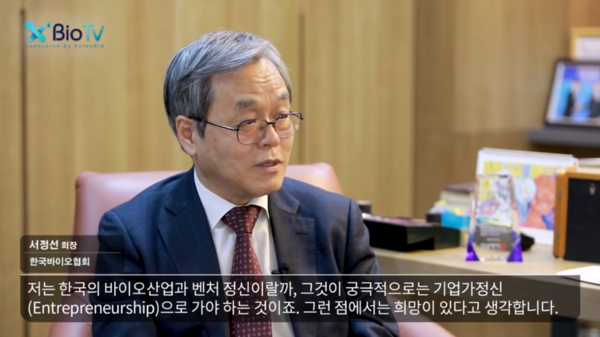“My experience of connecting with society through the Korea Biotechnology Industry Organization (Korea BIO) was very valuable in my life. I am always grateful to the employees I have worked with at the Korea BIO. I would like to thank our member companies and all those who love the biotech industry.”
Seo Jeong-sun, who stepped down from Korea BIO president on Wednesday, said this and other remarks at a video interview published on Korea BIO’s YouTube channel on Tuesday.

In the video, Seo looked back on Korea BIO’s achievements in the past decade and advised on the direction the nation’s biotech industry should go.
In 2000, Seo contributed to the Korea Bio Venture Association's foundation, now integrated in Korea BIO. “At the time, six companies joined efforts to establish the bio venture association and expressed their opinions. Since 2015, I have been serving as Korea BIO’s president for six years,” Seo said.
The first four years of Korea BIO was when the organization developed its expertise and built solidarity among member companies, and thought how to execute state projects well, Seo recalled.
For the next six years, Korea BIO provided “rough sketches” for the local biotech industry and suggested important business topics, he said.
Korea BIO’s other role is to mediate between the “top-down” policy and the “bottom-up” efforts of the private biotech sector.
Seo said the industry advocacy group’s role was particularly important in the Korean biotech industry.
“Once, Korea BIO joined a government’s meeting for export strategies where huge industry groups from automobile and petrochemical businesses were also in,” he said. “Our group’s role was to gather opinions from member companies when the government implemented its policy and to keep pace with the government’s stance.”
Comparing the U.S. biotech industry with that of Korea, Seo emphasized that the government’s deregulation was crucial to advance the biotech sector.
“The U.S. biotech industry is making a big footprint, which is quite different from the advancement of the Korean biotech sector. The U.S. industry is driven by powerful private players with a strong bottom-up force,” Seo said.
In contrast, the Korean sector is largely reliant on the government’s top-down policy, he added.
“Unless the government eases regulations, our industry cannot grow.”
Seo refuted some people’s claim that local biotech stocks were in a bubble.
He admitted that the domestic biotech sector began with the tech bubble. Since then, rosy outlooks on the human genome project have rarely yielded real returns, he said. Given the biotech industry's nature, people can think that it takes a very long time to have a return (profit), he said.
However, considering the increase of the elderly population, one of the characteristics of the 21st century, the nation cannot solve social issues without investing in the Fourth Industrial Revolution in medicine, such as information medicine and digital transformation, Seo noted.
“In the past, the biotech industry meant a sector where a bubble did not return as a profit. But now, it certainly needs investment, and the government should support the industry until it reaches a certain level,” he said.
According to Seo, as Korean biotech firms tend to grow too rapidly and startups try only initial public offering to realize profits, investors might suffer difficulties.
To reduce such problems, people who have already succeeded in the field should help venture companies, he said.
Seo praised the quality of Korea’s healthcare service.
“The level of Korean medicine is the same as that of the U.S. We should thank those who work in the Korean medical sector,” he said.
Korean doctors’ knowledge is no different from American physicians, and Korea’s IT power gives the nation a competitive edge to advance information medicine, he emphasized.
Seo predicted that if the government and the medical community integrate IT and healthcare services, information medicine will be a great asset for Korea in the future.
“I believe there is a hope in Korea’s biotech industry and venture companies’ spirit of risk-taking,” he said.
After the Korea BIO’s general meeting on Wednesday, Samsung Bioepis President Koh Han-seung took office as Korea BIO's next president.

